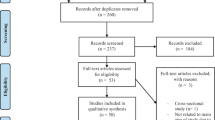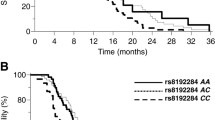Abstract
Purpose
To investigate the association of tumor necrosis factor-related apoptosis inducing ligand (TRAIL) gene polymorphisms with gastric cancer in Chinese Han population in central China.
Methods
A total of 304 patients with gastric cancer confirmed by histopathology and 421 unrelated healthy controls were studied. Gene polymorphisms of TRAIL (G1525A and C1595T) were genotyped by polymerase chain reaction-restriction fragment length polymorphism (PCR-RFLP) analysis.
Results
The frequency of the genotype carriers of TRAIL 1525A (GA + AA) and 1595T (CT + TT) was significantly lower in gastric cancer than in healthy controls (37.2% vs. 61.5%, P < 0.001, OR = 0.581, 95% CI 0.442 ~ 0.764; 36.2% vs. 62.0%, P < 0.001, OR = 0.570, 95% CI 0.433 ~ 0.750, respectively). Stratification analysis showed that both TRAIL 1525A (GA + AA) and 1595T (CT + TT) carriers were associated with poorly-differentiated gastric cancer compared to 1525GG genotype and 1595CC genotype (OR = 0.516, 95%CI 0.279 ~ 0.957, P = 0.026; OR = 0.395, 95%CI 0.207 ~ 0.753, P = 0.004, respectively).
Conclusions
TRAIL G1525A and C1595T gene polymorphisms were significantly correlated with the susceptibility to gastric cancer in Chinese Han population in central China.



Similar content being viewed by others
Abbreviations
- CI:
-
Confidence interval
- DR:
-
Death receptor
- EDTA:
-
Ethylenediamine tetraacetic acid
- Hp:
-
Helicobacter pylori
- OR:
-
Odds ratio
- RFLP:
-
Restriction fragment length polymorphism-polymerase chain reaction
- TIL:
-
Tumor-infiltrating lymphocytes
- TNF:
-
Tumor necrosis factor
- TRAIL:
-
Tumor necrosis factor-related apoptosis-inducing ligand
REFERENCES
Wiley SR, Schooley K, Smolak PJ, Din WS, Huang CP, Nicholl JK, et al. Identification and characterization of a new member of the TNF family that induces apoptosis. Immunity. 1995;3:673–82.
Pan G, O’Rourke K, Chinnaiyan AM, Gentz R, Ebner R, Ni J, et al. The receptor for the cytotoxic ligand TRAIL. Science. 1997;276:111–3.
Hu JK, Yang K, Li CM, Zhang B, Chen ZX, Chen XZ, et al. The expression of TRAIL and its receptors in gastric cancer and the apoptotic effect of rh-TRAIL on SGC7901 cells. Oncol Rep. 2009;21:681–8.
Li C, Xia B, Yang Y, Li J, Xia HH. TNF gene polymorphisms and helicobacter pylori infection in gastric carcinogenesis in Chinese population. Am J Gastroenterol. 2005;100:290–4.
Gray HL, Sorensen EL, Hunt JS, Ober C. Three polymorphisms in the 3′ UTR of the TRAIL (TNF-related apoptosis-inducing ligand) gene. Genes Immunol. 2001;2:469–70.
Kikuchi S, Miyagishi R, Fukazawa T, Yabe I, Miyazaki Y, Sasaki H. TNF-related apoptosis inducing ligand (TRAIL) gene polymorphism in Japanese patients with multiple sclerosis. J Neuroimmunol. 2005;167:170–4.
Yan X, Xu L, Qi J, Liang X, Ma C, Guo C, et al. sTRAIL levels and TRAIL gene polymorphisms in Chinese patients with fatty liver disease. Immunogenetics. 2009;61:551–6.
Chen B, Liu S, Wang XL, Xu W, Li Y, Zhao WH, et al. TRAIL-R1 polymorphisms and cancer susceptibility: an evidence-based meta-analysis. Eur J Cancer. 2009;45:2598–605.
Fernàndez V, Jares P, Beà S, Salaverria I, Guino E, de Sanjosé S, et al. Frequent polymorphic changes but not mutations of TRAIL receptors DR4 and DR5 in mantle cell lymphoma and other B-cell lymphoid neoplasms. Haematologica. 2004;89:1322–31.
Fisher MJ, Virmani AK, Wu L, Aplenc R, Harper JC, Powell SM, et al. Nucleotide substitution in the ectodomain of trail receptor DR4 is associated with lung cancer and head and neck cancer. Clin Cancer Res. 2001;7:1688–97.
Lee SH, Shin MS, Kim HS, Lee HK, Park WS, Kim SY, et al. Somatic mutations of TRAIL-receptor 1 and TRAIL-receptor 2 genes in non-Hodgkin’s lymphoma. Oncogene. 2001;20:399–403.
Frank B, Shanmugam KS, Beckmann L, Hemminki K, Brenner H, Hoffmeister M, et al. Death receptor 4 variants and colorectal cancer risk. Cancer Epidemiol Biomarkers Prev. 2006;15:2002–5.
Pal R, Gochhait S, Chattopadhyay S, Gupta P, Prakash N, Agarwal G, et al. Functional implication of TRAIL -716 C/T promoter polymorphism on its in vitro and in vivo expression and the susceptibility to sporadic breast tumor. Breast Cancer Res Treat. 2011;126:333–43.
Liang XS, Caporaso N, McMaster ML, Ng D, Landgren O, Yeager M, et al. Common genetic variants in candidate genes and risk of familial lymphoid malignancies. Br J Haematol. 2009;146:418–23.
Walczak H, Miller RE, Ariail K, Gliniak B, Griffith TS, Kubin M, et al. Tumoricidal activity of tumor necrosis factor-related apoptosis-inducing ligand in vivo. Nat Med. 1999;5:157–63.
Cretney E, Takeda K, Yagita H, Glaccum M, Peschon JJ, Smyth MJ. Increased susceptibility to tumor initiation and metastasis in TNF-related apoptosis-inducing ligand-deficient mice. J Immunol. 2002;168:1356–61.
Takeda K, Smyth MJ, Cretney E, Hayakawa Y, Yamaguchi N, Yagita H, et al. Involvement of tumor necrosis factor-related apoptosis-inducing ligand in NK cell-mediated and IFN-gamma-dependent suppression of subcutaneous tumor growth. Cell Immunol. 2001;214:194–200.
Holoch PA, Griffith TS. TNF-related apoptosis-inducing ligand (TRAIL): a new path to anti-cancer therapies. Eur J Pharmacol. 2009;625:63–72.
Koyama S, Koike N, Adachi S. Expression of TNF-related apoptosis-inducing ligand (TRAIL) and its receptors in gastric carcinoma and tumor-infiltrating lymphocytes: a possible mechanism of immune evasion of the tumor. J Cancer Res Clin Oncol. 2002;128:73–9.
Martin JH, Potthoff A, Ledig S, Cornberg M, Jandl O, Manns MP, et al. Effect of H. pylori on the expression of TRAIL, FasL and their receptor subtypes in human gastric epithelial cells and their role in apoptosis. Helicobacter. 2004;9:371–86.
Weber A, Wandinger KP, Mueller W, Aktas O, Wengert O, Grundström E, et al. Identification and functional characterization of a highly polymorphic region in the human TRAIL promoter in multiple sclerosis. J Neuroimmunol. 2004;149:195–201.
Komatsuda A, Wakui H, Iwamoto K, Togashi M, Maki N, Masai R, et al. Up-regulation of TRAIL mRNA expression in peripheral blood mononuclear cells from patients with active systemic lupus erythematosus. Clin Immunol. 2007;125:26–9.
Koyama S. Flow cytometric measurement of tumor necrosis factor-related apoptosis-inducing ligand and its receptors in gastric epithelium and infiltrating mucosal lymphocytes in Helicobacter pylori-associated gastritis. J Gastroenterol Hepatol. 2003;18:763–70.
ACKNOWLEDGMENTS AND DISCLOSURES
Changgao Wang Shufang Xu, and Fengming Yi contributed equallyto this work. This study was supported by Hubei Clinical Center & Key Laboratory of Intestinal & Colorectal Diseases (2008BCC002) and the Ministry of Public Health of China (200802156, 201002020). The authors declare that they have no competing interests.
Author information
Authors and Affiliations
Corresponding author
Rights and permissions
About this article
Cite this article
Wang, C., Xu, S., Yi, F. et al. Tumor Necrosis Factor-Related Apoptosis Inducing Ligand Gene Polymorphisms are Correlated with Gastric Cancer in Central China. Pharm Res 32, 762–768 (2015). https://doi.org/10.1007/s11095-013-1217-y
Received:
Accepted:
Published:
Issue Date:
DOI: https://doi.org/10.1007/s11095-013-1217-y




